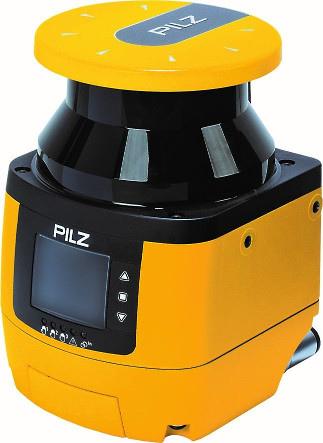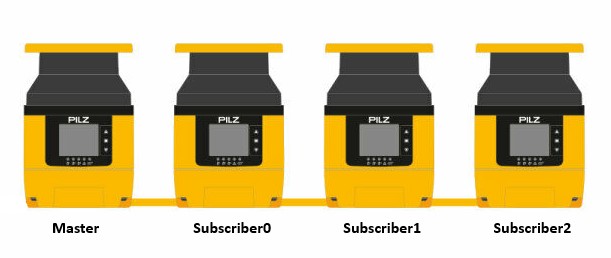Repository Summary
| Checkout URI | https://github.com/PilzDE/psen_scan_v2.git |
| VCS Type | git |
| VCS Version | ros2 |
| Last Updated | 2023-11-22 |
| Dev Status | DEVELOPED |
| Released | RELEASED |
| Tags | No category tags. |
| Contributing |
Help Wanted (-)
Good First Issues (-) Pull Requests to Review (-) |
Packages
| Name | Version |
|---|---|
| psen_scan_v2 | 0.20.0 |
README
PILZ safety laser scanner PSENscan
Package: psen_scan_v2
The psen_scan_v2 package is a ROS integration driver for the PSENscan safety laser scanner product. It lets you integrate the laser scanner data into your ROS Environment easily. Using the standard [sensor_msgs/LaserScan][] message format ensures compatibility with other laserscan-post-processing nodes such as [gmapping][]. For a general overview, link collection and tutorials we refer to the ROS wiki page.

PSENscan firmware >= 3.1.0 is supported on the following models:
| Type | Features | Order number |
|---|---|---|
| Common features:<ul><li>compliant and approved in accordance with: EN/IEC 61496-1: Type 3, EN ISO 13849-1: PL d, IEC 61508: SIL 2</li><li>opening angle: 275°</li><li>operating range: 3.0 or 5.5 m safety zone, 40 m warning zone</li><li>reaction time: 62 ms</li><li>Protection type: IP65</li><li>Dimensions (H x W x D) in mm: 152 x 102 x 112.5</li></ul> | ||
| Light versions Additional features: Muting, EDM, Override | ||
| PSEN sc L 3.0 08-12 | 3.0 m safety zone, 8 or 12-pin exchangeable memory module | 6D000012 |
| PSEN sc L 5.5 08-12 | 5.5 m safety zone, 8 or 12-pin exchangeable memory module | 6D000013 |
| Master versions Additional features: Muting, EDM, Override, restart in accordance with EN ISO 61496-3, vertical applications | ||
| PSEN sc M 3.0 08-12 | 3.0 m safety zone, 8 or 12-pin exchangeable memory module | 6D000016 |
| PSEN sc M 5.5 08-12 | 5.5 m safety zone, 8 or 12-pin exchangeable memory module | 6D000017 |
| PSEN sc ME 5.5 08-17 | Master Encoder, 5.5 m safety zone, 8/17-pin exchangeable memory | 6D000019 |
C++ standalone library
If you are interested in using the PSENscan safety laser scanner without ROS, please take a look at our C++ standalone library. You can read more about it in the standalone folder
Table of Contents
Installation
Needed Equipment:
- PSENscan safety laser scanner
- ROS Machine
To use the package, you can install prebuilt packages with
sudo apt install ros-$ROS_DISTRO-psen-scan-v2
Usage
To start reading data from the safety laser scanner and publishing scans execute ros2 launch psen_scan_v2 psen_scan_v2.launch.xml in a command line. This will launch the ROS Node with the default configuration.
If you wish to set parameters from the command line, add them to the end of the command as parameter:=value, separated by spaces.
ros2 launch psen_scan_v2 psen_scan_v2.launch.xml sensor_ip:=192.168.0.10
This example configures the safety laser scanner at 192.168.0.10 to send it´s frames to the ROS node at localhost.
In order to create an application with your own launch file, you can include the bringup.launch.xml, where you can easily adjust the configuration parameters. A more detailed explanation can be found in the tutorials.
Parameters
sensor_ip (string, default: “192.168.0.10”)
IP-Address of safety laser scanner.
Optional Parameters
tf_prefix (string, default: “laser_1”)
Name of this scanner that can be changed to differentiate between multiple devices. By convention this is used as tf prefix.
angle_start (double, default: -2.398 (= -137.4 deg))
Start angle of measurement. (Radian)
angle_end (double, default: 2.398 (= 137.4 deg))
End angle of measurement. It is included in the measurements. (Radian)
intensities (bool, default: false)
Publish intensities. If this is enabled, the resolution needs to be increased (at least 0.2 deg).
resolution (double, default: 0.0017 (= 0.1 deg))
Scan angle resolution. (Radian) The value is rounded to a multiple of 0.1 deg and has to be in the range [0.1, 10] degrees.
Expert Parameters (optional)
host_ip (string, default: “auto”)
IP-Address of host machine. The IP of the local machine is used by default.
host_udp_port_data (int, default: 55115)
UDP Port on which monitoring frames (scans) should be received.
host_udp_port_control (int, default: 55116)
UDP Port used to send commands (start/stop) and receive the corresponding replies.
File truncated at 100 lines see the full file
CONTRIBUTING
Repository Summary
| Checkout URI | https://github.com/PilzDE/psen_scan_v2.git |
| VCS Type | git |
| VCS Version | main |
| Last Updated | 2024-06-21 |
| Dev Status | DEVELOPED |
| Released | RELEASED |
| Tags | No category tags. |
| Contributing |
Help Wanted (-)
Good First Issues (-) Pull Requests to Review (-) |
Packages
| Name | Version |
|---|---|
| psen_scan_v2 | 0.10.2 |
README
PILZ safety laser scanner PSENscan
Package: psen_scan_v2
The psen_scan_v2 package is a ROS integration driver for the PSENscan safety laser scanner product. It lets you integrate the laser scanner data into your ROS Environment easily. Using the standard [sensor_msgs/LaserScan][] message format ensures compatibility with other laserscan-post-processing nodes such as [gmapping][]. For a general overview, link collection and tutorials we refer to the ROS wiki page.

Common features:
- Compliant and approved in accordance with:
- EN/IEC 61496-1: Type 3
- EN ISO 13849-1: PL d
- IEC 61508: SIL 2
- Opening angle: 275°
- Operating range: 3.0 or 5.5 m safety zone, 40 m warning zone
- Reaction time: 62 ms
- Protection type: IP65
- Dimensions (H x W x D) in mm: 152 x 102 x 112.5
The PSENscan firmware (3.1.x) is supported on the following models:
Light versions
| Type | Features | Order number | |———————–|————————————————————————–|————–| | PSEN sc L 3.0 08-12 | 3.0 m safety zone, 8 or 12-pin, two safety zones active at the same time | 6D000012 | | PSEN sc L 5.5 08-12 | 5.5 m safety zone, 8 or 12-pin, two safety zones active at the same time | 6D000013 |
Additional features: Muting, EDM, Override
Master versions
| Type | Features | Order number | |———————–|—————————————————————————|————–| | PSEN sc M 3.0 08-12 | 3.0 m safety zone, 8 or 12-pin, two safety zones active at the same time | 6D000016 | | PSEN sc M 5.5 08-12 | 5.5 m safety zone, 8 or 12-pin, two safety zones active at the same time | 6D000017 | | PSEN sc M 5.5 08-17 | 5.5 m safety zone, 8 or 17-pin, two safety zones active at the same time | 6D000019 | | PSEN sc ME 5.5 08-17 | 5.5 m safety zone, 8 or 17-pin, two safety zones active at the same time | 6D000034 |
Additional features: Muting, EDM, Override, restart in accordance with EN ISO 61496-3, vertical applications
Subscriber versions
| Type | Features | Order number | |———————–|—————————————————————————|————–| | PSEN sc S 3.0 08-12 | 3.0 m safety zone, 8 or 12-pin, two safety zones active at the same time | 6D000020 | | PSEN sc S 5.5 08-12 | 5.5 m safety zone, 8 or 12-pin, two safety zones active at the same time | 6D000021 |
Additional features: reference marks, vertical applications
C++ standalone library
If you are interested in using the PSENscan safety laser scanner without ROS, please take a look at our C++ standalone library. You can read more about it in the standalone folder.
Table of Contents
Installation
Needed Equipment:
- PSENscan safety laser scanner
- ROS Machine
To use the package, you can install prebuilt packages with
sudo apt install ros-$ROS_DISTRO-psen-scan-v2
Usage
This package is capable to read data from 1 Master safety laser scanner, and up to 3 Subscribers safety laser scanners, as shown below:

To read data and publishing scans from 1 safety laser scanner (Master, Light), execute in a command line:
```bash roslaunch psen_scan_v2 psen_scan_v2.launch sensor_ip:=192.168.0.10
File truncated at 100 lines see the full file
CONTRIBUTING
Repository Summary
| Checkout URI | https://github.com/PilzDE/psen_scan_v2.git |
| VCS Type | git |
| VCS Version | main |
| Last Updated | 2024-06-21 |
| Dev Status | DEVELOPED |
| Released | RELEASED |
| Tags | No category tags. |
| Contributing |
Help Wanted (-)
Good First Issues (-) Pull Requests to Review (-) |
Packages
| Name | Version |
|---|---|
| psen_scan_v2 | 0.10.2 |
README
PILZ safety laser scanner PSENscan
Package: psen_scan_v2
The psen_scan_v2 package is a ROS integration driver for the PSENscan safety laser scanner product. It lets you integrate the laser scanner data into your ROS Environment easily. Using the standard [sensor_msgs/LaserScan][] message format ensures compatibility with other laserscan-post-processing nodes such as [gmapping][]. For a general overview, link collection and tutorials we refer to the ROS wiki page.

Common features:
- Compliant and approved in accordance with:
- EN/IEC 61496-1: Type 3
- EN ISO 13849-1: PL d
- IEC 61508: SIL 2
- Opening angle: 275°
- Operating range: 3.0 or 5.5 m safety zone, 40 m warning zone
- Reaction time: 62 ms
- Protection type: IP65
- Dimensions (H x W x D) in mm: 152 x 102 x 112.5
The PSENscan firmware (3.1.x) is supported on the following models:
Light versions
| Type | Features | Order number | |———————–|————————————————————————–|————–| | PSEN sc L 3.0 08-12 | 3.0 m safety zone, 8 or 12-pin, two safety zones active at the same time | 6D000012 | | PSEN sc L 5.5 08-12 | 5.5 m safety zone, 8 or 12-pin, two safety zones active at the same time | 6D000013 |
Additional features: Muting, EDM, Override
Master versions
| Type | Features | Order number | |———————–|—————————————————————————|————–| | PSEN sc M 3.0 08-12 | 3.0 m safety zone, 8 or 12-pin, two safety zones active at the same time | 6D000016 | | PSEN sc M 5.5 08-12 | 5.5 m safety zone, 8 or 12-pin, two safety zones active at the same time | 6D000017 | | PSEN sc M 5.5 08-17 | 5.5 m safety zone, 8 or 17-pin, two safety zones active at the same time | 6D000019 | | PSEN sc ME 5.5 08-17 | 5.5 m safety zone, 8 or 17-pin, two safety zones active at the same time | 6D000034 |
Additional features: Muting, EDM, Override, restart in accordance with EN ISO 61496-3, vertical applications
Subscriber versions
| Type | Features | Order number | |———————–|—————————————————————————|————–| | PSEN sc S 3.0 08-12 | 3.0 m safety zone, 8 or 12-pin, two safety zones active at the same time | 6D000020 | | PSEN sc S 5.5 08-12 | 5.5 m safety zone, 8 or 12-pin, two safety zones active at the same time | 6D000021 |
Additional features: reference marks, vertical applications
C++ standalone library
If you are interested in using the PSENscan safety laser scanner without ROS, please take a look at our C++ standalone library. You can read more about it in the standalone folder.
Table of Contents
Installation
Needed Equipment:
- PSENscan safety laser scanner
- ROS Machine
To use the package, you can install prebuilt packages with
sudo apt install ros-$ROS_DISTRO-psen-scan-v2
Usage
This package is capable to read data from 1 Master safety laser scanner, and up to 3 Subscribers safety laser scanners, as shown below:

To read data and publishing scans from 1 safety laser scanner (Master, Light), execute in a command line:
```bash roslaunch psen_scan_v2 psen_scan_v2.launch sensor_ip:=192.168.0.10
File truncated at 100 lines see the full file


